by Naomi L. | October 7, 2016 | Flash Fiction, J.C. Wolfe's Writing |
“Thank you!”
It’s all still a blur, but I know I ended my Master’s thesis presentation with the biggest smile on my face. The applause rang in my head for hours afterward. I barely even remember the evaluators’ comments during the defense.
All I remember is their last question: “What next?”
I’d already thought about the question long and hard. Would I attain a Ph.D right away, or take a break to pursue creative writing?
I smiled and said I’d follow my passion. They thought I meant science. I knew better.
“On to the next chapter of my life!”
This is a little 100-word challenge I set for myself just for fun, loosely based on a true story. Hope you enjoyed the piece! Thanks for reading!
by Naomi L. | October 5, 2016 | Blog, Creative Writing, Featured |
Welcome to the first week of October, or as it’s come to be known here on The Wolfe’s (Writing) Den, “Romeo & Juliet Week”! Yes, every year around this time, I like to share a post about my favorite love story: since I started blogging in 2013, I’ve covered five points that are commonly missed, the reasons this is such a great love story, and a book review of Romeo & Juliet / West Side Story.
Now I’d like to continue the trend this year with a post about some of the lessons we can all learn from Shakespeare’s timeless romance. So on that note, here are five lessons about love in Romeo & Juliet! Enjoy!
1) Love is blind.
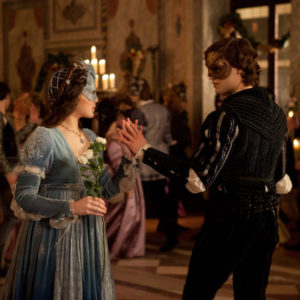
Romeo and Juliet meet at the Capulet Ball and fall in love at first sight (Romeo & Juliet, 2013)
This is arguably one of the most famous lessons taken from Romeo & Juliet (second to, if not tied with, the fourth point on this list). The city of Verona is torn by a feud between two influential households, “both alike in dignity”, yet against all odds, a pair of teenagers from either family find each other and fall in love at first sight. Initially blind to the fact they’re supposed to be enemies, they’re understandably shocked and disappointed after learning each other’s names, but still strive to be together in spite of the hatred that threatens to keep them apart.
Romeo and Juliet’s decision to set aside their differences in favor of romance proves true the famous idiom “love is blind”, and this has become a common theme in many adaptations. A well-known example is the musical West Side Story, in which a Polish-American boy and a Puerto-Rican girl fall in love against a backdrop of racial intolerance and street gang warfare. If there’s one lesson common to all versions of this story, it’s that love is and always will be universal. Be it in social position, race, or anything else, wherever fear and hatred create barriers, love will keep on tearing them down. Which goes to show…
2) Love brings out the best in us.
Too many people focus on the tragic themes in Romeo & Juliet without giving enough credit to the positive points. It’s easy to dismiss the title characters as naïve and misguided teenagers throughout this four-day course of events, but it’s important to keep in mind that they’re very different people by the end of the story than they were in the beginning.
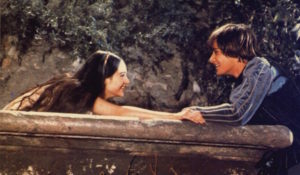
Romeo and Juliet profess their love for each other over Juliet’s balcony (Romeo and Juliet, 1968)
Remember that before Romeo meets Juliet, he quite possibly suffers from depression due to perceived parental neglect and a hopeless infatuation with a young lady named Rosaline. Meanwhile, Juliet before Romeo is the picture of an innocent and sheltered child, pressured by her parents into a marriage of convenience with virtually no freedom to pursue happiness on her own. As I’ve noted before, Romeo & Juliet can be considered a coming-of-age story because after these teenagers cross paths, they quickly blossom into more mature people: Romeo becomes a deeply passionate and devoted lover, Juliet becomes a strong and confident woman, and both are willing to sacrifice everything for the love that makes them the best possible versions of themselves.
Now you may argue that Romeo wasn’t all good inside because he murdered Tybalt, but don’t forget that this act is brought about by his anger over Tybalt murdering his friend Mercutio and has nothing to do with Romeo’s marriage to Juliet. It’s hatred that brings out the worst in this story’s characters, while love only ever brings them happiness and hope for a peaceful future, at least to the ones who are willing to seek it.
Unfortunately, as these young lovers quickly learn, love has a tragic side as well…
3) Life without love is not worth living.
Our idealistic young heroes clearly believed their story was destined to last a lifetime, but sadly, as we all know, it was not to be. In the beginning of Act V, Romeo’s entire world is shattered when he learns that his beloved Juliet is dead (which we know is only part of Friar Laurence’s master plan, but this poor kid missed the memo). Heartbroken, it takes him about a second to decide his next course of action: to drink poison and die at his wife’s side.
Melodramatic, much? Not for someone in Romeo’s shoes. Don’t forget, in the course of a day, this teenage boy lost his best friend, his family, his home, and his social standing, and only narrowly escaped Verona with his life. Juliet was his last ray of hope, and now suddenly, she’s gone too. What else is a grieving young lover, with nothing left to live for, to do but follow his beloved into the afterlife?
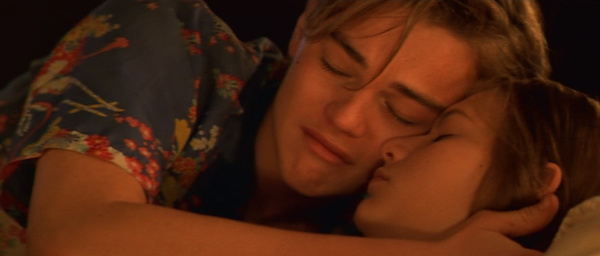
Romeo mistakenly believes Juliet is dead and resolves to die at her side (Romeo + Juliet, 1996)
Romeo’s decision to kill himself only after losing Juliet can be seen as a testament to how much she truly means to him. Even after losing everything else, he holds on to the hope of a future with her, and only gives up on life after that one hope is snatched away. Juliet, in turn, clearly loves Romeo just as deeply, as it also takes her literally a second to choose eternity in death with him over a miserable life alone. The star-crossed lovers are faced with an unthinkable choice in the play’s final scene, yet neither one of them hesitates to die for the other because they already know in their hearts the one truth no one else in the story seems to understand: life without love is not worth living.
Which leads us to the next lesson…
4) Love stories don’t always end happily.
Is there any tragedy in all of literature more famous than the plight of Shakespeare’s star-crossed lovers? Since premiering on stage just over four centuries ago, Romeo and Juliet have become the archetypal young lovers thwarted by fate, a symbol of romance doomed to a tragic end.
After learning of his wife’s supposed death, Romeo ventures into the Capulet tomb to say his final goodbye (“Eyes, look your last. / Arms, take your last embrace.” (5.3.112–13)) and die by Juliet’s side. Upon waking moments later and discovering her husband’s body, Juliet kisses him one last time and promptly plunges his dagger into her heart without a second thought (“O happy dagger, / This is thy sheath. There rust and let me die.” (5.3.169–70)). Fast forward to the Capulets and Montagues grieving for their dead children and the Prince chastising both families for leading these young lovers to their tragic end (“For never was a story of more woe / Than this of Juliet and her Romeo.” (5.3.309–10)).
As prolific readers and writers of romance well know, love stories don’t always end in “happily ever after”. Yet even tragic love stories can still drive home the most powerful message of all…
5) But in the end, love is still stronger than hate.
Romeo and Juliet may not have gotten their happy ending, but the love that compelled them to willingly die for each other still accomplished a miracle: it ended the generations-old feud between the Capulets and Montagues. This may seem like a consolation prize, but it’s still nothing to sneeze at; after all, not even the Prince of Verona could achieve peace between these families!
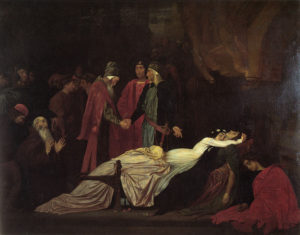
“The Reconciliation of the Montagues and Capulets over the Dead Bodies of Romeo and Juliet”, 1855, oil on canvas painting by Frederic Leighton
One of the central themes of Romeo & Juliet is passion, which manifests equally in love and in violence. Both are powerful and conflicting forces throughout the story, but ultimately, it’s love that conquers hate. To prove this point, compare the deaths of Romeo and Juliet to those of Mercutio and Tybalt. The latter pair engage in a heated duel and both end up suffering violent deaths brought on by anger and hatred; as a result, tensions between the Capulets and Montagues escalate and the feud only gets worse. In contrast, Romeo and Juliet, each the only child and last descendant of their respective families, willingly take their own lives in a final desperate act to escape the violent cycle keeping them apart and be united for eternity. Only then do Montague and Capulet realize their mistakes and make amends, for while they could easily blame Mercutio and Tybalt’s deaths on their enemies, they have no one to blame for Romeo and Juliet’s deaths but themselves.
Romeo & Juliet is one of the greatest love stories ever written, with strong lessons of romance that live on to this day. Whether proving that hatred kills or that love is the most powerful force in the world, Shakespeare’s classic play is a testament to the enduring passions of humanity, and it will always be my favorite story as much for the above lessons as for its ultimate message: life is fleeting, but love is forever.
What about you? What lessons do you think can be learned from Romeo & Juliet? What has this classic story taught you about love?
by Naomi L. | October 3, 2016 | Blog, Word of the Week |
Word: leitmotif
Pronunciation: LYT-moh-teef
Part of Speech: noun
Definition: a recurrent theme throughout a musical or literary composition, associated with a particular person, idea, or situation
Source: Oxford Dictionaries
Have you ever watched a movie or musical play and noticed that some pieces of the musical score always played when certain characters were on-screen/stage? This use of recurring themes is a popular trope in works that use music to convey ideas or represent characters. One of my favorite examples of such works is the video game Undertale, which makes heavy use of recurring and remixed musical themes to hint at connections between characters in the story. This has led to the common consensus among fans that creator Toby Fox is a genius when it comes to using “leitmotifs”!
A “leitmotif” is a theme that recurs throughout a musical or literary work and is associated with a particular person, idea, or situation. The word arose in English in the late 19th century and comes from the German noun Leitmotiv, meaning “leading motive”. This noun comprises the verb leiten “to lead” and the noun Motiv “motive”.
The word “leitmotif” was originally used in reference to Richard Wagner‘s operas and is a device most commonly associated with musical scores and soundtracks, as evidenced by its Wikipedia and TV Tropes pages, though its modern usage seems to be expanding its definition into literature. Note that “leitmotif” can also be spelled the original German way: “leitmotiv” (though it needn’t be capitalized in English as all nouns are in German). You may not find this word particularly useful if you only write literature, but if you compose music for stories (or write characters who do), “leitmotif” could be a handy addition to your vocabulary!
What are your thoughts on this word? Any suggestions for future “Word of the Week” featured words?






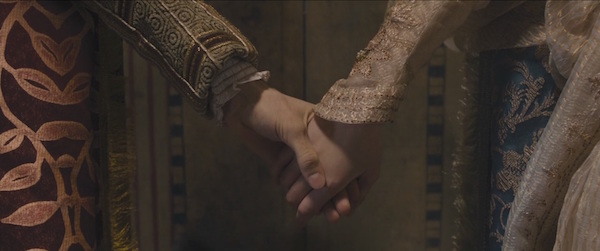

Recent Comments